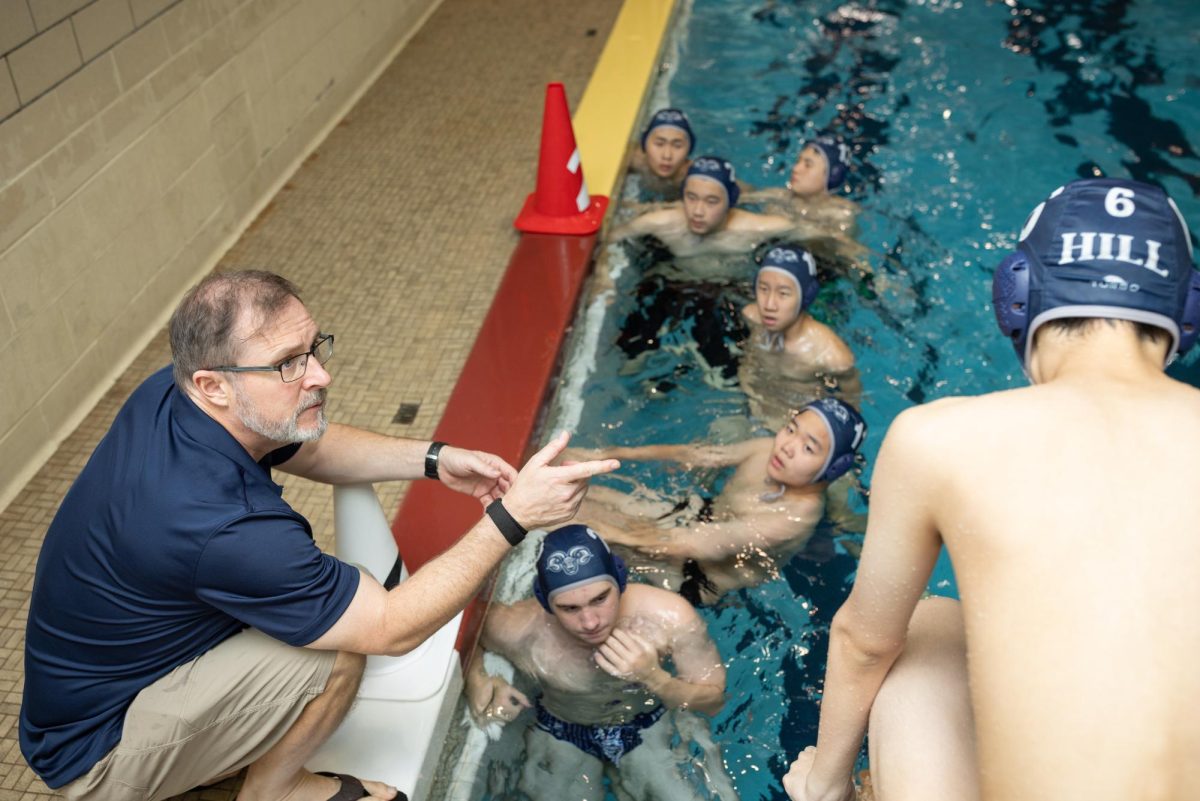The winter term at Hill has recently begun, and student-athletes have started trying out for varsity teams for the winter terms. Ones that don’t make varsity end up on junior varsity, or JV. Though experiences range between JV programs, most students involved in JV sports can expect a wide disparity with equipment, playing surface, and kits, and coaching staff availability.
To some student-athletes, not making the varsity team may seem demoralizing, and some may accept that they are unprepared for the varsity level. Varsity may sound like a great achievement, but it would be much more difficult to gain playing time.
Douglas Jones, head boys water polo coach, states that this difference in audience is derived from the difference in skill level., who coaches both varsity and JV boy’s water polo, has stated that if he was a JV player, he may “like the idea of having the varsity designation, but generally you would not be able to hold your own body.”
For water polo, both teams practice together, and the benefit of doing so includes JV players “truly realizing what you need to get to the higher level,” as Jones stated. Some of these JV players not only observe what’s happening at this higher level, but even end up matching up with some of these varsity players in practice. Usually, the JV team is an appropriate level of play for many younger players, and some less experienced older players.
Shannon Ruane, head girls JV soccer coach has stated it depends on the player, whether they enjoy JV or varsity more. She stated that players may like how “it can be really rewarding experience to play through your whole time at Hill and see improvement in that space.”
JV players and coaches have all noticed a large difference in the number of viewers for each game. There may be a variety of reasons behind this, and reasons could be different for every sport.
Jones mentioned that this difference in audience is derived from the difference in skill level. “I think you could make the comparison to high school sports and college sports, and then college sports and professional sports,” Jones said. “The higher the level of play the more exciting it is for fans to watch.”
According to Jones, these players are still “learning the game and building skills.” However, he then pointed out that these JV players may see more fans show up to varsity games and aspire to be on varsity eventually.
“We had very few people come to our games,” Grace Capecci of the JV field hockey team said. “But varsity definitely gets a crowd” Capecci observed that they “played at more awkward times than varsity,” and that may the reason for having less people show up.
Ruane believes that another factor is students watching what other people are watching. The example she used was the JV girls’ soccer game happening during the varsity boys’ soccer game. Little to no people showed up to the JV game, as most people were watching the Varsity game.
“I do love when we get fans who come to our games, and those fans tend to be a lot of the friends, people’s friends who come and watch them and support them,” Ruane said. “There could be something really powerful about having people there watching you play and knowing what it feels like to have people cheering you on.”
Even within the JV program, there is a variety of skill level. Abbie Figueroa, captain of the JV girls’ soccer team, observed that there was a wide range of skill level within her team. “It’s a wide variety some have played for their entire lives to people who’ve never played before.” Capecci mentioned that she herself only recently started playing field hockey. With so many people at so many different levels, it may be difficult to find a perfect area of focus.
Coach Ruane has stated that “what improvement looks like for one player on the JV team, can look very different from what it looks like for another player.” However, she also stated that varsity can have a wide range of skill level too. The big difference is that JV focuses more on individual improvement, while varsity wants to improve as a team.
“We were focusing on learning the rules of field hockey. Learning like positioning and things like that,” Capecci stated. “Whereas varsity, it’s more refining skills as in things that they already have, but we were trying to create skills.”
One positive seen on JV teams is the fact that everyone gets to play. Since players are still building experience, winning games isn’t the only goal. This is different from varsity, as it’s clear that many players don’t get to play.
“Varsity teams are going to focus on getting the results they want out of games more often, which doesn’t mean there won’t be times that they prioritize getting people different levels of experience different time in,” Ruane stated.
For some teams, such as the cross-country team, JV and varsity aren’t too different. For most meets, the entire team runs together. Sometimes, for big invitational meets, the top 7 runners are chosen. Otherwise, JV and varsity are quite similar.
Varsity and JV are quite different. Varsity teams have many benefits, representing our school on the field. That doesn’t mean JV doesn’t come with benefits, such as being a better environment for individual improvement and getting a fair amount of play time.
“Even though these players may not ever play the sport after they leave here, I think it’s really important for JV players to realize that when they’re here they’re athletes,” Ruane said. “They’re student athletes.”
























